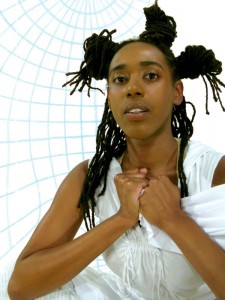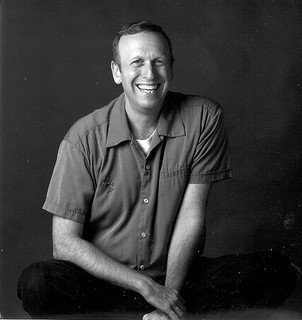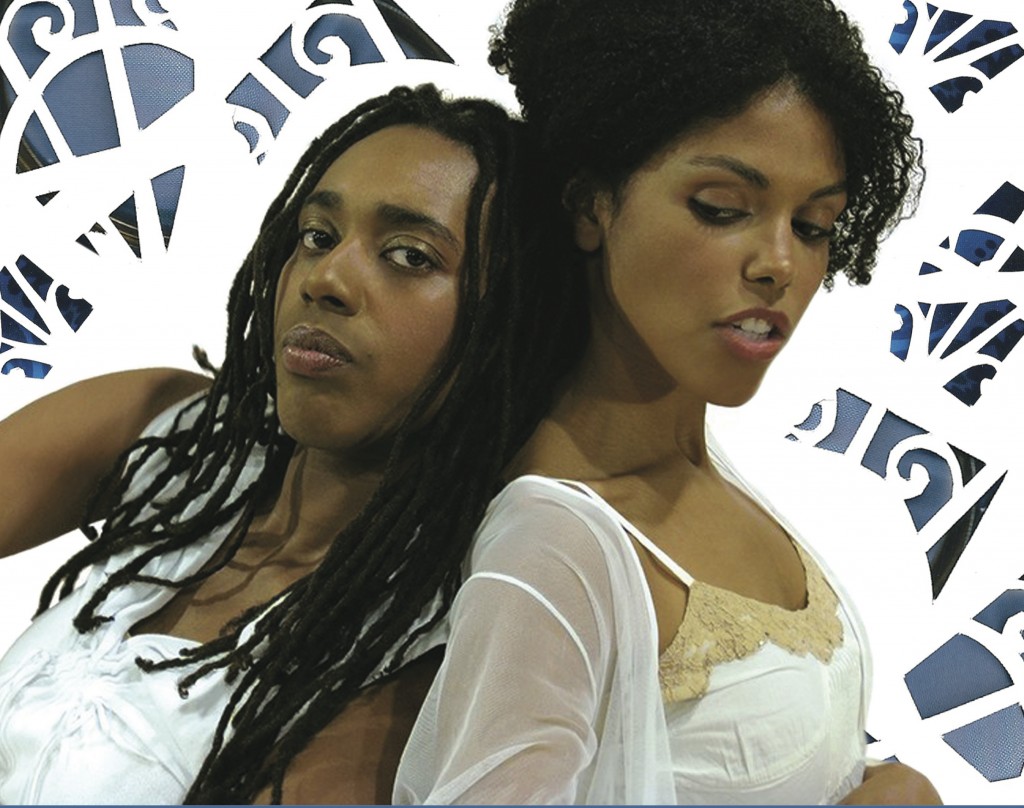Stage Interview: The Theater Offensive Brings Lenelle Moïse’s “Expatriate” to Boston
“One of the enormous changes I’ve seen is that in big city theater scenes, queer work isn’t so scarce anymore, which is great. These days, no major theater company in a city like Boston would program its season without discussing what might be of interest to gay men.”
Expatriate by Lenelle Moïse. Directed by Ashley Sparks. Presented by The Theater Offensive at Villa Victoria Center for the Arts, October 4 through 6.
By Ian Thal
This Columbus Day weekend, Boston expatriate, playwright, poet, singer, songwriter, and actor Lenelle Moïse brings her show Expatriate to the Villa Victoria Center for the Arts for its Boston Premiere after previous performances in New York and Seattle. The show tells the story of two women, Claudie and Alphine, who flee personal turmoil in their native Boston for a musical career in Paris, discovering how going abroad alters their sense of identity. Its jazz, soul, and funk inspired songs also appear on The Expatriate Amplification Project, an album recorded by Moïse and her co-star, Karla Mosley, which, like the stage show, dispenses with a band, opting for vocal loops as accompaniment.
“Rebel” from Lenelle Moise on Vimeo.
I interviewed Moïse by e-mail about Expatriate.
Arts Fuse: You’re coming to Boston starring in a show for which you have written the script and the songs. What’s the story of Expatriate?
Moïse: Expatriate is about Claudie and Alphine, two African-American women musicians who have conflicting philosophies about what it takes to be a successful artist. Claudie is disciplined, but she’s secretive and repressed. Alphine is magnetic, but she’s overindulgent and easily distracted by fleeting romances. We follow these characters from Boston to New York to Paris, tracking their painfully platonic friendship and their struggles with addiction, abandonment, and fame. They can’t live with each other. But they can’t thrive without each other.
AF: Though American expats can be found all over the world, the Parisian expatriate experience is as much part of American mythology as venturing into the frontier. Traveling to Europe plays a particularly significant role in African-American cultural history when one considers the number of Black artists and intellectuals (many of whom were also queer) who moved to Paris to escape the tyranny of pre-civil Rights America. What’s the symbolic role of Paris today?
Moïse: A lot of people associate French culture with pleasure and protest. From escargot to Picasso to the Marquis de Sade to Bastille Day, the French maintain a global reputation for being revolutionary, stylish, occasionally scandalous, and often cool. I think Black American artists—some of them women, some of them queer—share this reputation. Unfortunately, post-civil rights America still marginalizes creative professionals, women, LGBT folks, and people of color. Even President Obama has to deal with people not thinking he’s American enough because he’s of African descent. I wonder if Black expatriates can only feel American when they’re in exile? James Baldwin and Nina Simone had to relocate to France to feel respected as artists. Much of their work focused on American identity politics, but we remember it because it was skillful and beautiful. The French “get” beauty.
AF: The characters Claudie and Alphine come from Boston, as do you (though you now live in the bohemia of Northampton, MA) How do you expect the homecoming to affect the performances?
Moïse: Well, my extended family members, old friends, and colleagues in the Boston theater community will attend the show. I hope to make them proud! The first spoken line of the play is “What do you remember about Boston?” and Team Expatriate is excited to create new memories in this city I know and love.
AF: While you’re both author and actor, you’re working with a number of collaborators: You are sharing the stage with Karla Mosley, but there are also the contributions of director Ashley Sparks, sound designer Mikaal Sulaiman, and lighting designer Billy Muñoz. How has their work shaped Expatriate?
Moïse: Theater people use the phrase “triple threat” all the time, but Karla is a quadruple joy. She’s my original Off-Broadway co-star. As the piece evolves, she continues to bring passion, precision, virtuosity, and joie de vivre to the role of Alphine. Even when her character is being cruel or crazed, there’s something grounded and elegant about Karla’s approach. Ashley, Mikaal, and Billy are newer to the Expatriate family. Ashley leads with confidence, trust, patience, and a politicized eye. She also brings out the play’s ceremonial undertones. Mikaal’s sound design is intricate and haunting. Billy’s lighting will transport the characters and the audience. We all live in different parts of the country—New York, Massachusetts, California, Louisiana, and Texas. We’ve joined forces to develop a powerful, portable, performance-driven version of the show.
I also had the opportunity to interview The Theater Offensive’s artistic director, Abe Rybeck, both about TTO’s mission of presenting queer theatre to Boston audiences and the themes of Expatriate.
AF: The Theater Offensive has long engaged in outreach to Boston area LGBT youth. What specifically does theater offer to these youth that other LGBT organizations don’t? And conversely, what does TTO specifically offer to queer youth that other theater companies cannot?
Abe Rybeck: I was teasing one teenager in our True Colors OUT Youth theater troupe: “The last thing you need in your life is more drama, right?” But she got very serious and came right back at me with “True Colors is where I learn to put the drama on stage and put my life together.” The young people reflect on their experiences and what they see around them. Through theater, they can express their feelings about the world, but theater artists also learn to stand back and look from the outside in. This training helps young people from some of the poorest and toughest parts of our city become leaders in making their neighborhoods thrive. When I asked one True Colors member why he auditioned, he said, “At other theaters I always had to pretend to be someone I wasn’t. At True Colors, it comes down to being great at expressing who I really am.”
AF: In TTO press release you write about the plight of many urban, working class, queer youth of color rather starkly, “On one corner they’re beat up for being gay, but when they walk just up the street a shop owner won’t serve them because they look ‘like a Puerto Rican thug.’” How does expatriating oneself from one’s neighborhood, city, or country weigh against other options? Obviously there is the option of staying in one place, and building something—as you have done.
Rybeck: The Theater Offensive’s OUT in Your Neighborhood approach was inspired by a comment that a True Colors troupe member made during an improvisation. Ashley, a Haitian-American teen from Mattapan exclaimed, “I shouldn’t have to take two train and a bus just to be who I really am! I want to be out in my own neighborhood!” I thought, “Wow! That’s worth having a theater company about!” For queer people to fully participate in our neighborhoods is so important for everyone, but it’s hard for a lot of people too. I don’t want to give away too much about the ending of Expatriate. But I will say that sometimes we need to go far, far away, just to be able to go back home. Maybe that’s why every queer person seems to identify with Dorothy’s trip to Oz.
AF: You started TTO in 1989, making it roughly contemporary with political movements like ACT UP (AIDS Coalition To Unleash Power) and Queer Nation. This means that for over two decades, as well as producing its own work, TTO has also been a presenting organization for queer artists from all over the nation and world. What changes have you seen in the world of queer theater?
Rybeck: Yeah, we grew out of a queer, guerrilla street theater troupe called United Fruit Company that started doing AIDS and liberation-themed activism in 1985. So we actually predated ACT UP by a couple years [ACT UP was founded in 1987]. One of the enormous changes I’ve seen is that in big city theater scenes, queer work isn’t so scarce anymore, which is great. These days, no major theater company in a city like Boston would program its season without discussing what might be of interest to gay men. That puts many gay theater groups around the country in a real competitive tough spot.
On the other, sadder hand, many folks in our community—especially women and people of color—still don’t feel seen or understood or represented by those plays. That’s why working with our neighbors in Villa Victoria to present this stunningly profound show by queer women of color is right smack in the middle of The Theater Offensive’s mission.



